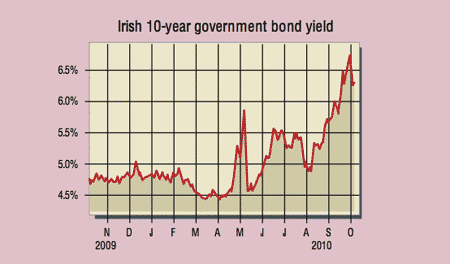
“Irish eyes are watering,” says Simon Nixon in The Wall Street Journal. Last week the Irish government announced that the cost of rescuing the banking system had jumped by another e12bn. The overall cost of shoring up the banks has now reached e45bn, and could eventually hit e50bn, or almost a third of GDP, if the sector requires further help. This year’s budget deficit therefore jumps by 20% of GDP to 32%, and overall public debt increases to almost 100% of GDP.
By finally putting a clear, if indicative, figure on the banks’ losses, the government hopes to “give certainty to both markets and Irish citizens” that the banking and debt crisis is over, say David Gardner and John Murray Brown in the FT. And the initial reaction from the markets was positive, with the ten-year government bond yield falling (see chart).
On the plus side, says Capital Economics, the cost of supporting the banks will be spread over ten years (although accounting rules dictate they must be included in the debt figures now). Ireland also has around e20bn of cash on hand. This means it won’t have to tap the markets again until next year. But Ireland has merely bought some time: “the broader economic and fiscal outlook is still deeply worrying”.
The government has promised a four-year plan next month to reduce its deficit to 3% of GDP by 2014, and a further austerity package of around e3bn is expected in December’s 2011 budget. But with growth disappointing, the adjustment will have to be bigger, according to the central bank, which this week lowered its growth forecast for 2010 from 0.8% to 0.2%.
The underlying fiscal deficit (minus the bank bail-outs) is now expected to be 11.9% this year, up from an estimate of 11.6% a year ago. Ireland may be on the brink of a vicious cycle in which spending cuts hamper the economy, cause further bank losses, lower tax revenues and raise debt, says Robert Peston on BBC.co.uk.
The Portuguese opposition is threatening to block the government’s latest debt-cutting proposals, and it’s unclear whether the Spanish and Greek populations will tolerate further austerity measures if growth undershoots expectations. “Fears of default and eurozone break-up,” says Capital Economics, “will linger for a long time yet.”